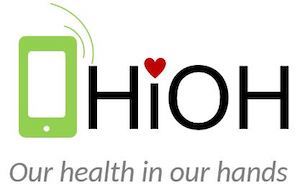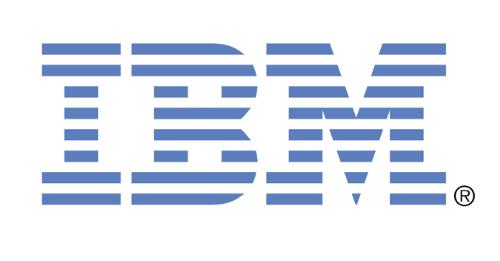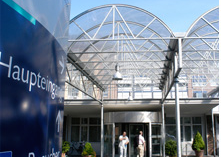Germany
See the following -
Harvard Medical School, Kiel University of Applied Sciences and others are using Nextcloud in the response to COVID-19
 Nextcloud Hub is used in dozens of universities, hospitals, and medical institutes in various ways, aiding in fighting the pandemic. The DICOM viewer app for Nextcloud in particular is used in Brazil in the fight against COVID-19. At the Kiel University of Applied Sciences Nextcloud is used in the development of bluetooth measurement algorithms from the OHIOH.de research team. This is a research project using machine learning and AI to improve the accuracy of Bluetooth-based COVID-19 tracking apps where information is collected through "Bluetooth". The application focuses on research topics to warn and help with required actions in fighting and minimizing the spread of COVID-19.
Nextcloud Hub is used in dozens of universities, hospitals, and medical institutes in various ways, aiding in fighting the pandemic. The DICOM viewer app for Nextcloud in particular is used in Brazil in the fight against COVID-19. At the Kiel University of Applied Sciences Nextcloud is used in the development of bluetooth measurement algorithms from the OHIOH.de research team. This is a research project using machine learning and AI to improve the accuracy of Bluetooth-based COVID-19 tracking apps where information is collected through "Bluetooth". The application focuses on research topics to warn and help with required actions in fighting and minimizing the spread of COVID-19.
- Login to post comments
How Munich rejected Steve Ballmer and kicked Microsoft out of the city
Breaking up with Microsoft is hard to do. Just ask Peter Hofmann, the man leading the City of Munich's project to ditch Windows and Office in favour of open source alternatives. Read More »
- Login to post comments
How the Open Knowledge Lab is Using Open Source Smog Sensors to Improve Air Quality in Germany
 Stuttgart, Germany has, like many other cities, a smog problem—even if it may be less severe than in other cities. The European Union has defined a threshold of on average 50 micrograms of dust particles per cubic meter in a 24-hour window of air to be allowed for a maximum of 35 days a year. For the last few years, actual values have been much higher for more than 35 days. There are governmental stations that measure the air pollution, but they can’t be everywhere for obvious reasons. The Open Knowledge Lab in Stuttgart, Germany has begun to develop their own IoT sensors that measure air quality every minute and report the data to a central server. It is then possible to display the smog levels on a map. See the map we're using...
Stuttgart, Germany has, like many other cities, a smog problem—even if it may be less severe than in other cities. The European Union has defined a threshold of on average 50 micrograms of dust particles per cubic meter in a 24-hour window of air to be allowed for a maximum of 35 days a year. For the last few years, actual values have been much higher for more than 35 days. There are governmental stations that measure the air pollution, but they can’t be everywhere for obvious reasons. The Open Knowledge Lab in Stuttgart, Germany has begun to develop their own IoT sensors that measure air quality every minute and report the data to a central server. It is then possible to display the smog levels on a map. See the map we're using...
- Login to post comments
IBM & Ponemon Institute Study: Data Breach Costs Rising, Now $4 million per Incident
 IBM Security today announced the results of a global study analyzing the financial impact of data breaches to a company's bottom line. Sponsored by IBM and conducted by the Ponemon Institute, the study found that the average cost of a data breach for companies surveyed has grown to $4 million, representing a 29 percent increase since 2013...
IBM Security today announced the results of a global study analyzing the financial impact of data breaches to a company's bottom line. Sponsored by IBM and conducted by the Ponemon Institute, the study found that the average cost of a data breach for companies surveyed has grown to $4 million, representing a 29 percent increase since 2013...
- Login to post comments
Knowledge Unlatched and University of Michigan Library Announce Collaboration to Advance Open Access
 Knowledge Unlatched (KU), a not-for-profit company based in England, and University of Michigan Library (U-M Library), a major research library based in Michigan, are pleased to announce that they will collaborate to study and overcome remaining obstacles to the spread of Open Access scholarly publishing in the Humanities and Social Sciences. Under the arrangement, U-M Library will provide a North American base for KU which has recently also established presences in Germany and Australia...
Knowledge Unlatched (KU), a not-for-profit company based in England, and University of Michigan Library (U-M Library), a major research library based in Michigan, are pleased to announce that they will collaborate to study and overcome remaining obstacles to the spread of Open Access scholarly publishing in the Humanities and Social Sciences. Under the arrangement, U-M Library will provide a North American base for KU which has recently also established presences in Germany and Australia...
- Login to post comments
Knowledge Unlatched Make Open Access Open for Trade Partners
Knowledge Unlatched (KU) is partnering with a number of sales agents specializing in library sales to better promote its Open Access offering to libraries. Starting in September, countries including Austria, Germany, Italy, Israel, Russia, Singapore, Switzerland, The Netherlands and Turkey will be covered by three different partners: Schweitzer, Karger Libri and Casalini Libri will join KU’s long-standing partner LYRASIS and include information Knowledge Unlatched into their outreach towards librarians in their core markets...
- Login to post comments
Latest 'Open Source' & eHealth News from Europe
The news just keeps coming about the widespread acceptance and increasingly rapid deployment and use of 'open source' software solutions by local and national government agencies in Europe. Federal, state, and local government agencies across the U.S. should pay close attention. Read More »
- Login to post comments
Medical Superbugs: Two German Hospitals Hit with Ransomware
 At least two hospitals in Germany have come under attack from ransomware, according to local reports. The alarming incidents follow similar ransomware problems at the US Hollywood Presbyterian Medical Center. Both the Lukas Hospital in Germany's western city of Neuss and the Klinikum Arnsberg hospital in the German state of North Rhine-Westphalia were attacked by file encrypting ransomware, Deutsche Welle reports...
At least two hospitals in Germany have come under attack from ransomware, according to local reports. The alarming incidents follow similar ransomware problems at the US Hollywood Presbyterian Medical Center. Both the Lukas Hospital in Germany's western city of Neuss and the Klinikum Arnsberg hospital in the German state of North Rhine-Westphalia were attacked by file encrypting ransomware, Deutsche Welle reports...
- Login to post comments
New German coalition backs local-owned or 'open source' software
Germany's new coalition government listed open source software among its IT policy priorities... Read More »
- Login to post comments
New Open Source License For Seeds
 The Germany-based OpenSourceSeeds initiative this month started to offer open source-licensed seeds in an effort to strengthen a form of copyleft for new plant varieties. The goal, according to the organisation established by academics, activists and breeders and establish a non-private seed sector as a second pillar alongside private plant breeding...
The Germany-based OpenSourceSeeds initiative this month started to offer open source-licensed seeds in an effort to strengthen a form of copyleft for new plant varieties. The goal, according to the organisation established by academics, activists and breeders and establish a non-private seed sector as a second pillar alongside private plant breeding...
- Login to post comments
NSA Spying Risks $35 Billion In U.S. Technology Sales
International anger over the National Security Agency’s Internet surveillance is hurting global sales by American technology companies and setting back U.S. efforts to promote Internet freedom. Read More »
- Login to post comments
Obama Lets NSA. Exploit Some Internet Flaws, Officials Say
Stepping into a heated debate within the nation’s intelligence agencies, President Obama has decided that when the National Security Agency discovers major flaws in Internet security, it should — in most circumstances — reveal them to assure that they will be fixed, rather than keep mum so that the flaws can be used in espionage or cyberattacks, senior administration officials said Saturday. But Mr. Obama carved a broad exception for “a clear national security or law enforcement need,” the officials said, a loophole that is likely to allow the N.S.A. to continue to exploit security flaws both to crack encryption on the Internet and to design cyberweapons.
- Login to post comments
Off-Grid Phone System to the Rescue
 An emergency mobile phone system developed at Flinders University has been acknowledged in international InnovationXchange awards for post-disaster relief work in the Pacific. The Australian Government’s Pacific Humanitarian Challenge is running the awards competition to acknowledge and develop outstanding efforts to improve faster, cheaper and effective aid responses to Pacific nations. Among 129 applications from 20 countries, the first-round winners included solutions to communications, logistics and finance in disaster situations, including the acclaimed free smartphone system built on the Serval Project at Flinders...
An emergency mobile phone system developed at Flinders University has been acknowledged in international InnovationXchange awards for post-disaster relief work in the Pacific. The Australian Government’s Pacific Humanitarian Challenge is running the awards competition to acknowledge and develop outstanding efforts to improve faster, cheaper and effective aid responses to Pacific nations. Among 129 applications from 20 countries, the first-round winners included solutions to communications, logistics and finance in disaster situations, including the acclaimed free smartphone system built on the Serval Project at Flinders...
- Login to post comments
Open Access 2015: A Year Access Negotiators Edged Closer to the Tipping Point
 It’s the year many negotiators got seriously tough on double dipping – charging for both the ability to read (via subscriptions) and for publishing (author processing charges, or APCs). Last year it was France getting tough on the toughest negotiator: Elsevier. This year, the Netherlands took it right to the brink of cutting Elsevier loose. It was summed up by a January headline: “Dutch universities dig in for long fight over open access.” Coming into the new year, other nations were taking up positions about the future they want to see too...Here’s a month-by-month roundup of some of the major action...
It’s the year many negotiators got seriously tough on double dipping – charging for both the ability to read (via subscriptions) and for publishing (author processing charges, or APCs). Last year it was France getting tough on the toughest negotiator: Elsevier. This year, the Netherlands took it right to the brink of cutting Elsevier loose. It was summed up by a January headline: “Dutch universities dig in for long fight over open access.” Coming into the new year, other nations were taking up positions about the future they want to see too...Here’s a month-by-month roundup of some of the major action...
- Login to post comments
Open Source Recognized As A Key Economic Pillar In European Union Study
 A September 2021 study on the economic impact of open source software and hardware concluded that open source technologies injected EUR 65-95 billion into the European economy. This study is timely given the current rollout of the European Union's EUR 750 billion recovery investment, which has allotted 20% for digital transformation. Growing political efforts to understand and quantify the importance of open source in realizing EU digital sovereignty accentuate the study's significance. The European Union sponsored the study, which was written by Fraunhofer ISI and OpenForum Europe.
A September 2021 study on the economic impact of open source software and hardware concluded that open source technologies injected EUR 65-95 billion into the European economy. This study is timely given the current rollout of the European Union's EUR 750 billion recovery investment, which has allotted 20% for digital transformation. Growing political efforts to understand and quantify the importance of open source in realizing EU digital sovereignty accentuate the study's significance. The European Union sponsored the study, which was written by Fraunhofer ISI and OpenForum Europe.
- Login to post comments